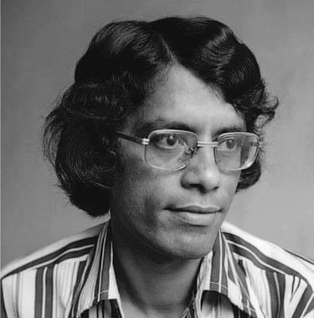
Humayun Azad was a Bangladeshi poet, novelist, short-story writer, critic, linguist, columnist and professor of Dhaka University. He wrote more than 70 titles. He was awarded the Bangla Academy Literary Award in 1986 for his contributions to Bengali linguistics. In 2012, the government of Bangladesh honored him with Ekushey Padak posthumously for his contributions to Bengali literature.

Humayun Ahmed was a Bangladeshi novelist, dramatist, screenwriter, filmmaker, songwriter, scholar, and academic. His breakthrough was his debut novel Nondito Noroke published in 1972. He wrote over 200 fiction and non-fiction books. He was one of the most popular authors and filmmakers in post-independence Bangladesh. Pakistani English newspaper Dawn referred to him as the cultural legend of Bangladesh.
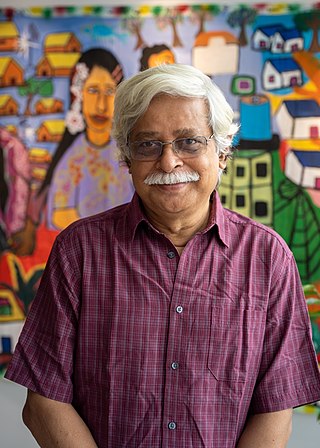
Muhammed Zafar Iqbal is a Bangladeshi science fiction author, physicist, academic, activist, former professor of computer science and engineering, and former head of the department of Electrical and Electronic Engineering (EEE) at Shahjalal University of Science and Technology (SUST). He achieved his PhD from University of Washington. After working 18 years as a scientist at California Institute of Technology and Bell Communications Research, he returned to Bangladesh and joined Shahjalal University of Science and Technology as a professor of Computer Science and Engineering. He retired from his teaching profession in October 2018.
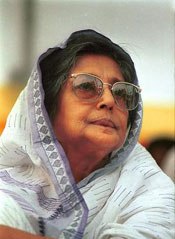
Jahanara Imam was a Bangladeshi writer and political activist. She is known for her efforts to bring those accused of committing war crimes in the Bangladesh Liberation War to trial. She has been called "Shaheed Janani".

Suborna Mustafa is a Bangladeshi television, film and stage actress. She is a former Jatiya Sangsad member representing the Reserved Women's Seat-4 from 2019 to 2024. She is a member of Bangladesh Awami League party.

Television is one of the most popular forms of media and information in Bangladesh. It was one of the first countries in South Asia to introduce television on 25 December 1964, in the then East Pakistan under the state-owned television network Pakistan Television Corporation in its capital, Dhaka. After the Bangladesh Liberation War in 1971, the Dhaka television station of PTV was renamed to Bangladesh Television, which had a monopoly on the country's television industry until 1997, with the launch of ATN Bangla on satellite television. Since then, the number of privately owned television channels saw a tremendous rise in the Bangladeshi television market.

Bangladesh Jamaat-e-Islami, previously known as Jamaat-e-Islami Bangladesh, is a Bangladeshi Islamist political party; it is the largest Islamist political party in Bangladesh.
Impress Telefilm Limited is a media production house in Bangladesh, formed in 2003. The company produces film, drama, and drama serials, music videos, variety shows, magazine programmes, musical programmes, and documentaries as well as TV commercials. It was founded by Faridur Reza Sagar.

Prof. Abdur Razzaq was a Bangladeshi scholar, academic, public intellectual and one of the first National Professors of Bangladesh.
Abul Kalam Azad, also known by the nickname Bacchu Razakar, is a former Bangladeshi politician of the Jamaat-e-Islami, televangelist and convicted war criminal of the Bangladesh Liberation War. He was also the leader and founder of one of the "Razakar" paramilitaries, the Kharadia Military.

Pak Sar Jamin Sad Bad is a 2004 Bangladeshi Bengali novel, written by Humayun Azad. The novel is based on an imagined Islamic fundamentalist political party that wants to make Bangladesh a Sharia law based Islamic state.
Irreligion in Bangladesh is rare and uncommon publicly. A Gallup survey conducted between 2014 and 2015 found that approximately less than 1% identified as convinced atheists in the poll. Bangladesh has 165.2 million people as of the 2022 census.
Attacks by Islamist extremists in Bangladesh took place during a period of turbulence in Bangladesh between 2013 and 2016 when a number of secularist and atheist writers, bloggers, and publishers in Bangladesh; foreigners; homosexuals; and religious minorities such as Hindus, Buddhists, Christians and Ahmadis who were seen as having offended Islam and Muhammad were attacked in retaliation, with many killed by Muslim extremists. By 2 July 2016, a total of 48 people, including 20 foreign nationals, had been killed in such attacks. These attacks were largely blamed on extremist groups such as Ansarullah Bangla Team and Islamic State of Iraq and Syria. The Bangladeshi government was criticized for its response to the attacks, which included charging and jailing some of the secularist bloggers for allegedly defaming some religious groups; or hurting the religious sentiments of different religious groups; or urging the bloggers to flee overseas. This strategy was seen by some as pandering to hard line elements within Bangladesh's Muslim majority population. About 89% of the population in Bangladesh is Sunni Muslim. The government's eventual crackdown in June 2016 was also criticized for its heavy-handedness, as more than 11,000 people were arrested in a little more than a week.
Naem Nizam is a Bangladeshi journalist, writer, columnist, and editor of daily Bangladesh Pratidin. Nizam is also the director of East West Media Group, the largest media conglomerate in Bangladesh. He is former CEO of News24 and Radio Capital. He is the former managing director of STV-US.

Agamee Prakashani is a Bangladeshi publishing house located in Dhaka.

Sadat Hossain is a Bangladeshi author, poet, screenwriter, film-maker and novelist. He described himself as a storyteller.

Deyal is a 2013 political/historical novel by Bangladeshi writer Humayun Ahmed, based on the socio-political crisis in the aftermath of the war of independence of Bangladesh. It was the last novel of the writer and was published one year after his death. The publication of the book was delayed by a High Court verdict.
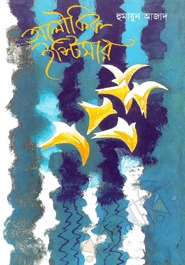
Aulaukik Istimaar is a book which consists of a collection of Bengali poetry by Bangladeshi author Humayun Azad. It was the first book of Azad which was published in 1973 from Khan Brothers and Company, Dhaka. A reprint was published from Agamee Prakashani later. The poems in the book are able to foreshadow the mainstream and style of broad thought in Azad's later life poetry.
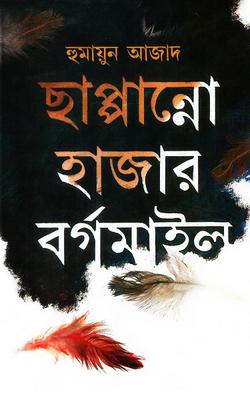
Chhappanno Hajar Borgomail is a 1994 Bangladeshi Bengali-language novel written by Bangladeshi author Humayun Azad. It was the first published novel written by the author. The novel was about 1980's decade's Bangladesh when the country faced social changes during Hussain Muhammad Ershad's rule. The main protagonist character of this novel is Rashed who teaches in Dhaka University; the character is believed to be inspired from Humayun Azad's own character who hated military rule, dictatorial governance and religious fundamentalism. Humayun Azad metaphorically indicated Hussain Muhammad Ershad by creating the fictitious character 'General Uddin Mohammad'. The basic story of the novel is based on Humayun Azad's own experiences. The novel is considered one of the major works of Humayun Azad. Azad dedicated the novel to the lead character of this novel - Rashed, which is also the nickname of his father.
"Bhat De Haramzada, Noile Manchitro Khabo" is a famous Bengali-language Bangladeshi poem written by Rafiq Azad. It is included in his poetry book Simaboddho Jole, Simito Sobuje. Its subject is Bangladesh famine of 1974 that was the cause of food shortage in Bangladesh. After the poem's publication, rumors spread that it was written with the then prime minister Sheikh Mujibur Rahman in mind. It has 33 rhythmic lines.














